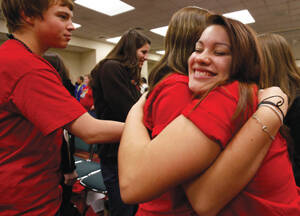Peace and justice are built on “a profound respect for every human being and helping others to live a life consonant with this supreme dignity,” Pope Benedict XVI said in his message for the World Day of Peace 2012, celebrated by the church on Jan. 1. When young people recognize the dignity and beauty of every human life, including their own, and are supported in their natural desire to make the world a better place, they become agents of justice and peace in the world, Pope Benedict said. This observation introduced his theme for the 2012 celebration, “Educating Young People in Justice and Peace.”
Peace is not simply a gift to be received from God, the pope said; it is a task people of good will must undertake. “In order to be true peacemakers, we must educate ourselves in compassion, solidarity, working together, fraternity, in being active within the community and concerned to raise awareness about national and international issues and the importance of seeking adequate mechanisms for the redistribution of wealth, the promotion of growth, cooperation for development and conflict resolution,” he said.
Adults have a serious responsibility to help the young fulfill their potential, Pope Benedict added, not just by sharing information with them, but by being “authentic witnesses” through lives marked by the joy of faith, charity and respect for others. Educating people in justice and peace begins in the family, where young people learn to value the gift of life, solidarity, respect for rules, forgiveness and hospitality, he said. Too many today are missing that basic human formation because “we are living in a world where families, and life itself, are constantly threatened and not infrequently fragmented.”
Pope Benedict appealed to parents to give their children “the most precious of treasures,” which is the gift of their time. The pope also urged governments to make it possible for parents to choose the type of education they want their children to receive and to enact immigration reforms aimed at “reuniting families separated by the need to earn a living.”
The pope also asked parents and teachers to be more attentive to the hopes and fears of young people and to their search for true values, and he asked governments to put more resources into education and job creation. Pope Benedict encouraged young people themselves to take their schooling seriously and to be open to the example and knowledge their elders have to share. He urged them “to be patient and persevering in seeking justice and peace, in cultivating the taste for what is just and true, even when it involves sacrifice and swimming against the tide.”
Cardinal Peter Turkson, president of the Pontifical Council for Justice and Peace, said Pope Benedict sees young people not only as hope for the future, but as “an active part, the most vital part of the human family” in a world that needs their energy and new ideas now.
Bishop Mario Toso, secretary of the justice and peace council, said the young people who energized the Arab Spring movements toward democracy this past year illustrate the fact that the young have a positive role to play in society. They proclaimed to the world that “there can be social justice in their societies if there is democracy and, vice versa, that if there is democracy, there can be social justice,” he said.
The heart of the pope’s message focused on what he called the “integral formation of the person, including the moral and spiritual dimension.”
“Man is a being who bears within his heart a thirst for truth,” Pope Benedict wrote, “a truth which is not partial, but capable of explaining life’s meaning—since he was created in the image and likeness of God.” Acknowledging God as creator leads to recognizing “one’s own profound dignity and the inviolability of every single person,” Pope Benedict said.








